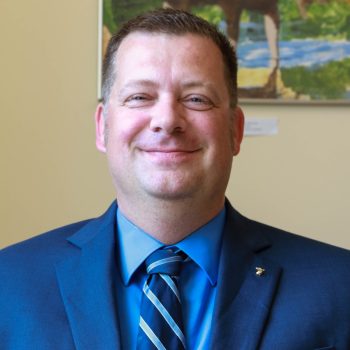
Current position: Early College Education Pathways and Early College Coordinator at the Maine Department of Education
Libby began his career in education at Clarkson University in Potsdam, New York. Leaving as associate dean of students, he returned to Maine and served as executive director of a historic preservation non-profit for seven years. Libby entered state service in 2014 as a public policy analyst and began working at the Maine Department of Education in 2018 where he had previously interned in 1999. He currently administers the Department’s early college coursework programs and state diploma program, among other duties. Additionally, Libby taught history and political science coursework at Central Maine Community College and co-taught a political science course at The University of Maine. Libby has served on multiple community organizations boards and committees including the Androscoggin Land Trust, Pine Tree Council Scouts of Maine, Maine Historic Preservation Commission, Maine Bicentennial Commission, and several municipal committees
Degrees:
- PhD in Public Policy with a concentration in Educational Leadership and Policy, University of Southern Maine, 2022
- MSEd in Higher Education Administration, University of Maine, 2001
- BA in Political Science, University of Maine, 1999
Dissertation
Title: Rural Secondary School Educator Perceptions of College Going Culture In Their Schools
Abstract: Postsecondary education enrollment and attainment are indicators that are continually examined by policymakers, business leaders and the community-at-large to understand the overall health of a community, state, or country. Communities in Maine and in other rural states have seen dramatic shifts in their local economies which have increased the need for postsecondary credentialing. For rural communities, schools play an important role in developing aspirations and expectations for postsecondary education and career planning. The school’s culture has a significant role in instilling in students and their families the importance of thinking about life after high school. This nonexperimental quantitative research study explores rural secondary school educator perceptions of college-going culture in their schools, with analysis for identifying differences in perceptions based upon the educator’s role, and differences among their perceptions when looking at their school’s enrollment, graduation rate, postsecondary enrollment rate, per pupil spending, and economically disadvantaged student status. Building administrators, school counselors, and classroom teachers at 75 rural schools in Maine were surveyed for their perceptions of their schools’ college-going culture. Results of the study indicate statistically significant differences in perceptions when comparing for certain educator positions and for school variables related to postsecondary enrollment and economically disadvantaged student status rates.

